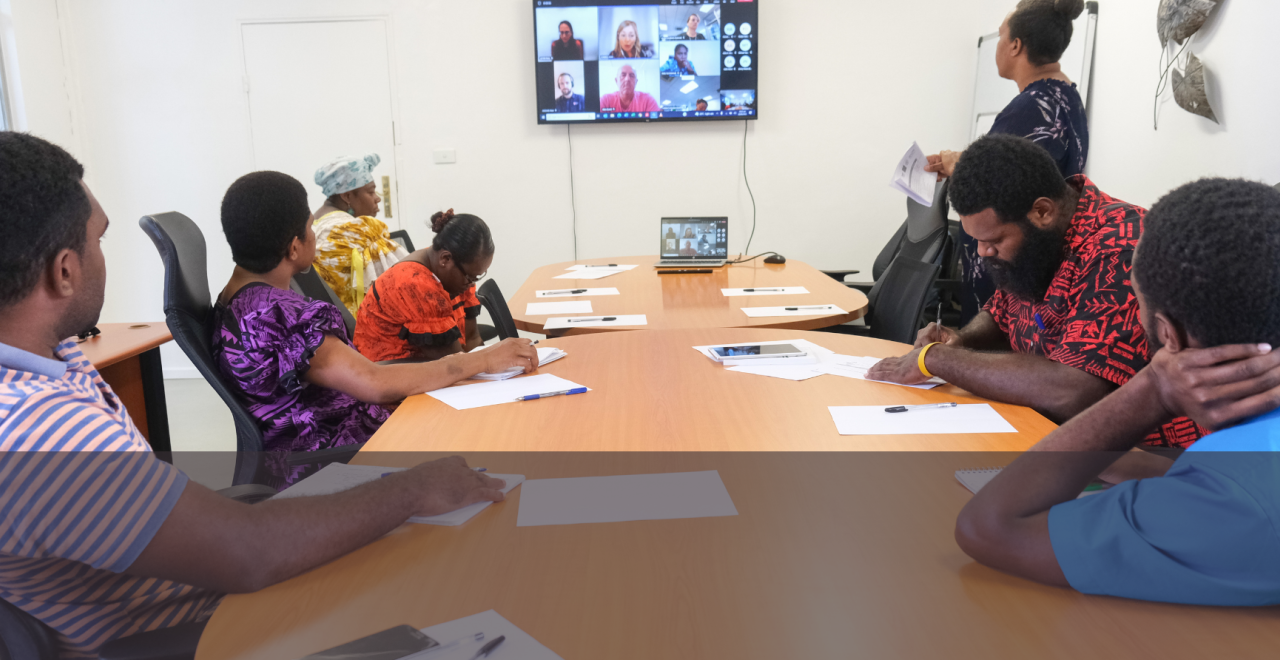No room for gender-based violence in evacuation centres

Port Vila, 30 June 2022 - Key experts and stakeholders working on disaster preparedness and response to gender-based violence in emergencies (GBViE) in Vanuatu joined a Stakeholder Update event to mark the conclusion of initial work aimed to prevent, mitigate, and respond to GBV in evacuation centres.
The event, organised by the National Disaster Management Office (NDMO), the Department of Women’s Affairs (DWA), and the International Organization for Migration (IOM), with the support of the European Union-funded Spotlight Initiative, involved participants from the NDMO, Displacement Cluster, Gender & Protection Cluster and other interested stakeholders from both government agencies and non-governmental organizations.
“Vanuatu is the highest at-risk country in the world for natural disasters and is also home to some of the world’s highest rates of domestic violence, without adequate gender-responsive actions, our country can become the epicentre of a systematic human catastrophe”, said Seman Naomi Dalesa, Acting Director of DWA.
“We are working together, engaging with different stakeholders and experts, to co-design women- and survivor-centred actions to prevent, mitigate, and respond to GBV in evacuation centres during disasters”, she added.
“We are working together, engaging with different stakeholders and experts, to co-design women- and survivor-centred actions to prevent, mitigate, and respond to GBV in evacuation centres during disasters”, Seman Naomi Dalesa, Acting Director of DWA.
During the event, experts from IOM presented the results of the preparatory work leading up to the drafting of the GBViE Standard Operating Procedure (SOP) Template for Evacuation Centres Guidance Document. This included the initial findings of a desktop review of relevant international, national and provincial documents to develop best practice guidance for Vanuatu, and the results of the initial consultation phase, which involved 13 Government agencies and 10 NGO/UN/Civil Society representatives, in partnership with NDMO, and National and Sanma & Shefa-based stakeholders.
“Emergencies are known to exacerbate pre-existing vulnerabilities. It is the responsibility of all humanitarian actors, to provide programmes and services that prevent and mitigate the risk of GBV in emergencies (GBViE), and provide services that respond to the needs of survivors”, saidJimmy Naura, Acting Director, NDMO, Vanuatu. Vanuatu.
“It is important to create an eco-system that empowers women, girls and at-risk groups and integrate GBV prevention and mitigation strategies from the beginning of the emergency”, he concluded.
“It is important to create an eco-system that empowers women, girls and at-risk groups and integrate GBV prevention and mitigation strategies from the beginning of the emergency” - Jimmy Naura, Acting Director, NDMO
“IOM works towards mitigating GBV risks in crises, supporting survivors by facilitating access to survivor-centred and multi-sectoral services, and addressing GBV root causes by working closely with communities to progressively transform the conditions that perpetuate GBV”, said Jessie, Chief of Mission, IOM Vanuatu
“We are engaging with all parties involved in emergency response, and everybody is committed to converging resources and knowledge to ensure that in times of crisis we leave no one behind”, she concluded.
“We are engaging with all parties involved in emergency response, and everybody is committed to converging resources and knowledge to ensure that in times of crisis we leave no one behind” - Jessie Connell, Chief of Mission, IOM Vanuatu
The SOP hinges on three principles: 1) Rights-based approach, affected populations are ‘rights-holders’, and any action addressing their needs has to look into the root causes of the inequities and discrimination that exist in communities to provide sustainable solutions. 2) Survivor-Centred Approach, service providers need to design their services and spaces to ensure survivors can exercise their right to self-determination and dignity, safety, confidentiality, and non-discrimination. 3) Do No Harm Principle, humanitarian actors aim to minimise the harm to the affected population when providing assistance.
The SOP guidance document and training also zeroes in on roles and responsibilities in “effective reporting and referral mechanisms”, which are processes in place to facilitate GBV survivor's access to different professionals or services such as health, psychosocial, safety/security and legal/justice. It also includes the processes by which the different professionals or service providers communicate and work together and access sectors to ensure quality and safe survivor-centred care is provided to GBV survivors.
The updated Guidance Document complements the revision of the NDMO’s National Evacuation Centre Management Guidelines being conducted under the Sef Ples Blong Yumi project (funded by the Australian Government) and is aligned with other national protocols such as the Ministry of Health “National Standard Operating Procedure For Clinical Management of Sexual and Gender-based violence” (2021). It is a stepping stone and a live document that the Displacement and Gender & Protection Cluster can use to steer and stimulate discussion on how to improve prevent, mitigate, and respond to GBV in evacuation centres.
The Spotlight Initiative is a global initiative of the United Nations which has received generous support from the European Union. Its aim is to eliminate all forms of violence against women and girls.
By Cristina Comunian
